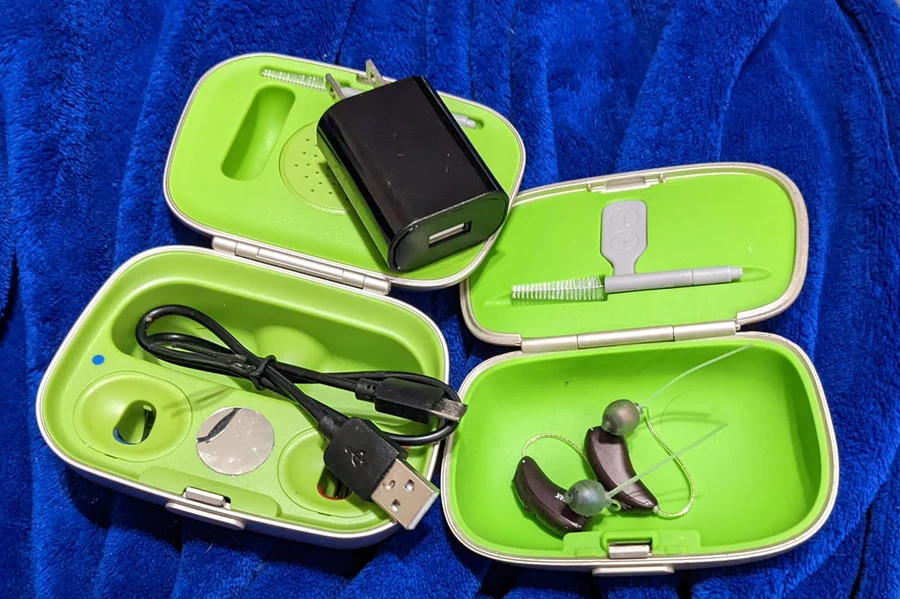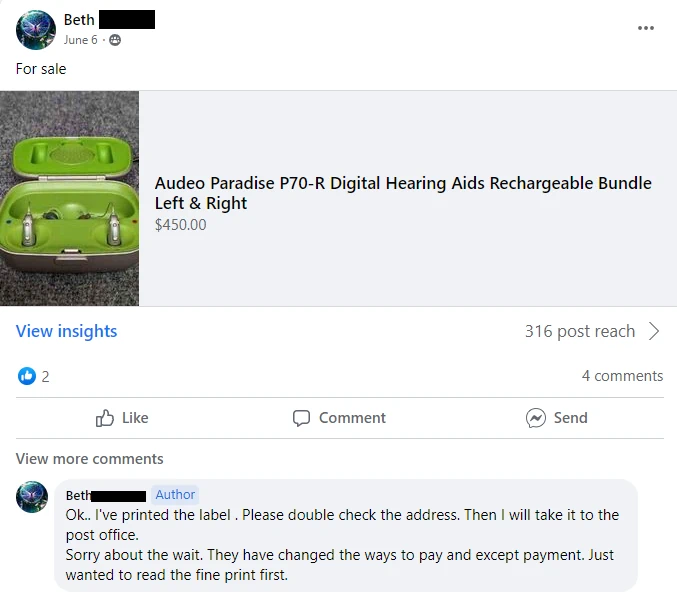As a professional audiologist, I encounter many patients who are considering purchasing used hearing aids online to save money. They can often find used hearing aids in Facebook groups or classified websites. While this may initially seem like a good idea, there are several risks involved in this process that potential buyers should be aware of.
Risk 1: Incorrect Fit and Comfort
Hearing aids are often custom-fit to the user’s ear.
- Used hearing aids may not fit correctly. This can lead to discomfort or even pain, making the device difficult to wear for extended periods. The length of the hearing aid wire may be the wrong size
- A poor fit can also compromise the hearing aid’s effectiveness, leading to subpar sound quality and rendering the device less helpful for the user.
Risk 2: Lack of Proper Programming
Hearing aids must be programmed according to each individual’s hearing loss profile. Unless the hearing aid is a self-fitting OTC device you will need to get it programmed by an audiologist.
- Online sellers often cannot provide this customization, resulting in a device that is not optimized for the buyer’s hearing needs.
- Without proper programming, a hearing aid can be frustrating to use, too loud or may not provide the desired improvement in hearing.
Risk 3: Uncertain Condition and Lifespan
The condition and remaining lifespan of a used hearing aid can be uncertain, the device may be damaged and in need of repair, which can add to the cost.
- It’s hard to know how well a hearing aid has been cared for before it was sold. Mistreatment can shorten the device’s lifespan or affect its functionality.
- Batteries in used hearing aids may need to be replaced soon after purchase, adding to the overall cost.
- Hearing aids have a lifespan of around 5 to 7 years on average. If a used hearing aid is already several years old, it may need to be replaced sooner than expected.
Risk 4: Lack of Warranty and Aftercare Services

New hearing aids usually come with a warranty and aftercare services, which are not typically available for used devices.
- Many manufacturers void the warranty on their devices if they’re sold to a new user. This means you’re out of luck if your used hearing aid malfunctions or breaks. They will also not be eligible for replacement if you lose an aid under an L&D policy.
- Aftercare services, such as maintenance and repairs, are often unavailable for used hearing aids. This means you could end up paying out-of-pocket for these services.
Risk 5: Inadequate Sanitation
Used hearing aids might not have been adequately sanitized, which can present health risks.
- Ear infections can be transferred via unsanitized hearing aids. Buying from an unverified online seller increases this risk.
- It can be difficult to fully sanitize a hearing aid at home due to its small parts and delicate electronics.
Risk 6: Potential for Fraud
Online transactions, especially for valuable items like hearing aids, often come with a risk of fraud.
- Fraudulent Sellers: Some sellers may misrepresent the condition, age, or brand of the hearing aid they’re selling. They may even claim to sell a top-tier brand hearing aid, when in fact they are offering a knock-off or a substantially older model. This can lead to buyers receiving a device that is less effective, or more worn out, than they were led to believe.
- Payment Scams: Sellers may ask for payment via untraceable or non-refundable methods. Once the payment is made, they may disappear without delivering the promised hearing aid.
- Identity Theft: Providing your personal information to untrustworthy online sources also increases the risk of identity theft. A scammer could use your name, address, and payment information to commit further fraud.
- Nonexistent Sellers: In some cases, the seller might not even have a hearing aid to sell. They might set up fake listings just to lure in potential victims. After payment is received, they vanish, leaving the buyer with no hearing aid and a lighter wallet.
In order to protect yourself from these types of fraud, consider the following precautions:
- Always use trusted platforms and payment methods that offer buyer protection.
- Be wary of deals that seem too good to be true. They often are.
- Before purchasing, do some research on the seller. Check for reviews or feedback from previous customers.
- Never share sensitive personal information, like Social Security numbers or bank account details, with sellers.
By keeping these risks and precautions in mind, you can make an informed decision about purchasing used hearing aids online. It’s always best to consult with an audiologist or another trusted healthcare professional before making significant decisions about your hearing health.
Risk 7: No Trial Period
New hearing aids always come with a trial period, which isn’t typically offered with used hearing aids purchased online.
- Testing Compatibility: Hearing aids are complex devices and it often takes some time for the user to determine if a specific device meets their needs. A trial period allows the user to test the device in their day-to-day life and assess whether it’s a good fit for their lifestyle and type of hearing loss.
- No Return, No Refund: Used hearing aids purchased online usually don’t come with a trial period or a return policy. This means that if you’re not satisfied with the device for any reason—be it comfort, sound quality, or functionality—you are stuck with it, making it a potentially risky investment.
Conclusion
In conclusion, while the initial cost savings of buying used hearing aids online may be tempting, it’s important to consider these risks. As a certified audiologist, my advice is to always consult with a healthcare professional before making such decisions. I believe you are much better off buying an affordable new professionally fit device or buying a new OTC hearing aid.

